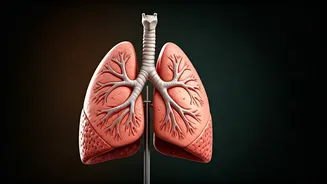Instant Calm
Deep breathing, even for a short duration like five minutes, provides almost instantaneous effects on your nervous system. When you're stressed, your body
activates the 'fight or flight' response, which increases your heart rate and releases stress hormones like cortisol. Deep, slow breaths, especially when focused on the exhale, activate the parasympathetic nervous system – the 'rest and digest' state. This counteracts the stress response, lowering your heart rate, reducing blood pressure, and promoting a feeling of calm. This allows you to regain composure and approach situations with greater clarity. Practicing deep breathing exercises can quickly calm the nervous system, offering a practical, readily available tool for managing stress in everyday life.
Sharper Focus
The benefits of deep breathing extend beyond immediate stress relief; it also enhances mental clarity and focus. The practice increases the supply of oxygen to the brain, which is essential for optimal cognitive function. This increased oxygen supply helps improve concentration, memory, and overall mental performance. Regular practice can help reduce brain fog, allowing for clearer and more focused thinking. Students, professionals, or anyone seeking to improve their mental acuity might find that incorporating this short exercise into their routines offers significant benefits. By calming the mind and increasing oxygen flow, deep breathing sets the stage for enhanced cognitive performance throughout the day.
Emotional Regulation
Deep breathing helps in emotional regulation by providing a pause between a stimulus and your reaction. In moments of heightened emotion, such as anger or frustration, taking a few deep breaths can provide a buffer, preventing impulsive reactions. This pause gives you time to assess the situation and respond thoughtfully rather than react emotionally. By consciously focusing on your breath, you can detach from the intensity of the emotion, enabling a more balanced and rational response. Over time, practicing deep breathing cultivates emotional resilience, making it easier to navigate challenging situations with greater composure and control, leading to improved interpersonal relationships and a greater sense of inner peace.
Simple Techniques
Several effective deep breathing techniques can be practiced in just five minutes. One popular method is diaphragmatic breathing, also known as belly breathing. To practice this, place one hand on your chest and the other on your abdomen. Inhale slowly through your nose, allowing your abdomen to rise as your diaphragm contracts. Exhale slowly through your mouth, feeling your abdomen fall. Another effective technique is box breathing, where you inhale for a count of four, hold for four, exhale for four, and hold again for four, repeating the cycle. These techniques can be easily incorporated into daily routines, providing a quick and efficient way to reap the benefits of deep breathing. Consistent practice of these techniques makes stress management more manageable.
Integrating It
Integrating deep breathing into your daily life can be surprisingly simple. Begin by setting aside a few minutes each day, perhaps first thing in the morning or during a mid-day break. Choose a quiet space where you won't be disturbed and find a comfortable position, either seated or lying down. Close your eyes and focus on your breath, following the chosen technique. It’s also useful to incorporate deep breathing into activities you already do, such as waiting in line or commuting. Over time, this practice will become a natural and automatic response to stress, enhancing your overall well-being and building resilience to life's challenges. Consistency is key, and even a few minutes each day can make a significant difference.














